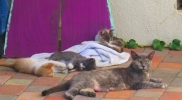|
|
Best Trivia - Food
|
Favorite Trivia – FOOD & DRINK
|
|
President Nixon had a bottle of Chateau Margaux secretly served to him at dinner parties. It was wrapped in a napkin to hide it from the other guests who were served something different.
Joy Sterling – Vintage Feasting
|
|
To dine with “Duke Humphrey” is to go without dinner (or to have no dinner to go to).
The phase, common in Elizabethan literature, is said to be from the practice of the poor gentry, who beguiled the dinner hour by a promenade near the tomb of Humphrey, Duke of Gloucester, in Old Saint Paul’s.
|
|
Vinaigrette wasn’t always associated with salad dressings. From the late-eighteenth century until the middle of the nineteenth, it was the name given to a small box made of gold, mother-of-pearl, or ivory. Fashionable ladies of the time wore the box on a necklace and inside they kept a small sponge soaked in aromatic vinegar. The sponge was used to dab foreheads and temples when the ladies felt flushed.
Rachel Khoo – The Little Paris Kitchen
|
|
“… it is the proud privilege of human beings to eat without hunger and drink without thirst.”
P. Morton Shand – A Book of Food
|
|
“In November, a police chief in Oklahoma complained after a Starbucks employee labeled cups for several officers with the word ‘PIG.’ Starbucks apologized and fired the employee.”
Los Angeles Times, December 15, 2019.
|
|
“If it’s not that great, it’s not worth the weight.”
Patty Martino Alspaugh
|
|
“I won first prize
with my bakin’
and every woman ask for my
pecan pie recipe
and every man for my home
address.”
Pamela Strobel
|
|
“I don’t care how high you set the bar, as long as I can reach my drink.”
refrigerator magnet
|
|
“All real men love to eat. Any man who picks at his food, breaking off little pieces with his fork, pushing one aside, picking up another, pushing bits around the plate, etc., usually has something wrong with him. And I don’t mean with his stomach.”
Marlene Dietrich’s ABC
|
|
“It is not everyone that may lightly claim skill in the dining art, without first mastering the subtle theory of flavours. Nor is it enough to sweep up fish from the expensive stall, not knowing which are better with sauce, and which, if broiled, will tempt the tired guest to raise himself once more upon his elbow.” [Satires, II, IV.]
Horace: Satires, Epistles and Ars Poetica, trans. by H. Ruston Fairclough
|
|
“They were given a spread-eagled chicken . . .” [better known today as either spatchcocked or butterflied chicken]
Gustave Flaubert – Sentimental Education
|
|
“The Greeks believed that the drinking of unmixed wine, wine undiluted by water, drove men crazy.’ [JS]
Prometheus Bound – Aeschylus (trans. by James Scully)
|
|
“The problem with the designated driver program, it’s not a desirable job. But if you ever get sucked into doing it, have fun with it. At the end of the night, drop them off at the wrong house.”
Jeff Foxworthy (That’s Really Funny)
|
|
“I hear Socrates saying that the best seasoning for food is hunger, for drink, thirst.” [De Finibus., II, 28.]
Cicero
|
|
“People in LA are deathly afraid of gluten. I swear to god, you could rob a liquor store in this city with a bagel.”
Ryan Reynolds
|
|
“Frozen fish, which is becoming more and more general, has inevitably lost part of its original flavour which no defrigeration can hope to restore. An essential precaution in the preparation of all fish is rapid cleansing under running water, for fresh fish should never to be allowed to soak in water for any period, however brief, as the inevitable result is that part of its essential soluble goodness, or osmazome, soon begins to escape into the water. Steaming is nearly always to be preferred to boiling for the same reason.”
P. Morton Shand – A Book of Food
|
|
“Thank you for the champagne.
It arrived, I drank it and I was gayer.”
Marilyn Monroe to the local German consul (Dear Los Angeles)
|
|
“O doesn’t really care what gets into Spam, as long as spam gets into her.”
“Paradise” (Don Winslow – Broken)
|
|
“Use only those clams which give a clear sound when hit together. Remove those which give a dull sound, because they are dead.”
Local Suzuki – Japanese Homestyle Cooking
|
|
“In England, at least, it were easier to separate the consideration of Church and State than to divorce eggs from bacon.”
P. Morton Shand – A Book of Food
|
|
9. The Myth of Translation.
Try a simple sentence: ‘I am hungover.’
For Japanese, ‘I suffer the two-day dizzies.’
In Czech, ‘The monkeys swing inside my head.’
Italians say, ‘Today, I’m out of tune.’
Languages aren’t codes that correspond—
in Arabic, there’s no word for ‘hungover.’
Beth Ann Fennelly – The Impossibility of Language
|
|
“… the Arabs fought among themselves and let Christians alone. Raki, the Arab drink, was very cheap, and the bistro was open at all hours, for the Arabs—lucky men—had the power of working all day and drinking all night.”
George Orwell – Down and Out in Paris and London
|
|
“It is not so much a comparison between the kitchen battery in England and on the Continent that is most humiliating to ourselves; it is the ingredients which the cook has at her disposal here and there. This can be briefly exemplified by reference to the principal cuisines of Europe as revealed in their simplest terms: that is to say, what the cooks of the five nations concerned have to cook with:
The basis of French cookery is butter
The basis of Italian cookery is olive oil
The basis of German cookery is lard
The basis of Russian cookery is sour cream
The basis of English cookery is water or drippings.”
P. Morton Shand – A Book of Food
|
|
“Wine disposes the heart to tenderness and makes it easy to inflame; cares disappear, washed away by abundant libations. Then come the laughs. The poor man retrieves his courage and believes himself to be rich. There are no more regrets and no more worries; the countenance brightens, the heart expands, and frankness, yesterday so rare, banishes the cunning of it.”
Ovid’s The Art of Love, trans. by Ronald Seth
|
|
“‘[Says Eve,] AA was the social scene of all time. All of L.A. was there. And the last straw was different for everybody. My friend Connie said she had to fuck two midgets before she knew it was time to join. It was great.’
“So great, in fact, that Eve encouraged non-substance-abusers to attend meetings, just for kicks. Eve’s friend, writer Sarah Kernochan: ‘The way Eve got me to go to AA—and I wasn’t an alcoholic—was by telling me, “The best stories are in AA. You’ll hear the best stories.” And the stories were the best. A lot of people in Los Angeles are performers, and the zeal with which they talked about their high highs and low lows was enthralling.'”
Lili Anolik – Hollywood’s Eve: Eve Babitz and the Secret History of L.A.
|
|
“One not only drinks wine, one smells it, observes it, tastes it, sips it—and one talks about it.”
King Edward VII
|
|
apple: An excellent thing—until you have tried a peach. – George du Maurier
Webster’s Unafraid Dictionary: Defiant Definitive Put-Downs – Leonard Louis Levinson
|
|
“This country loves guns so much, we have a Salad Shooter.”
Bill Maher (That’s Really Funny)
|
|
“He [Dionysus] found the liquid shower hid in the grape.
He rests man’s spirit dim from grieving,
When the vine exalteth him.
He giveth sleep to sink the fretful day in cool forgetting . . .
“For his kingdom, it is there,
In the dancing and the prayer,
In the music and the laughter,
In the vanishing of care,
And of all before and after;
In the Gods’ high banquet, when
Gleams the grape-blood, flashed to heaven;
Yea, and in the feasts of men
Comes his crownèd slumber; then
Pain is dead and hate forgiven!”
Euripides – The Bacchae , trans. by Gilbert Murray
|
|
“What a miracle cannot the wine-cup work! It unlocks the secrets, bids hopes be fulfilled, thrusts the coward into the field, takes the load from anxious hearts, teaches new arts. The flowing bowl—whom has it not made eloquent? Whom has it not made free even amid pinching poverty?” [Epistles, I. V.]
Horace: Satires, Epistles and Ars Poetica, trans. by H. Ruston Fairclough
|
|
“Frogs—Frogs for long provided one of the the silliest of national taunts with which beefy Britons could gibe at froggy Frenchmen. Frogs make very delicate eating, being at their best in the autumn. The hind-legs only are eaten. In some parts of France the Grenouillières, or Frogwomen, still go round from house to house offering their live frogs, assorted in grades of sizes and prices (the medium-sized being the most esteemed) and preparing such as are bought for table, which is a considerable and hereditary art beyond the ordinary prowess of even a French cook.
“Snails—This is a convenient place to make short note on edible snails or escargots. These animals, which belong to a particular species of large white snail, called the Vigneron, are carefully bred on a very large scale in Champagne and Burgundy, being fed exclusively on vine-leaves. After being collected they are accorded an involuntary fast of about a month until they have sealed up their shells. They are then taken out, cleaned and put back in their shells, the mouths of which are stuffed with a farce made of butter, chopped parsley and garlic.”
P. Morton Shand – A Book of Food
|
|
“Hangover: The best way to avoid getting a hangover is not to stop drinking long enough to have one.”
Evan Esar – Esar’s Comic Dictionary
|
|
“Beer on wine, you’re fine. Wine on beer, stand clear.” [November 9, 1991]
David Sedaris – Theft by Finding: Diaries (1977-2002)
|
|
If you had a rough day, it’s reason to drink. If you had a good one, it’s reason to celebrate.”
James Brown (“Instructions On The Use Of Alcohol”)
|
|
“Why is a birthday cake the only food you can blow on and spit on and everybody rushes to get a piece?”
Bobby Kelton (That’s Really Funny)
|
|
“Perfect is a word associated with Martha [Stewart] . . . This fixation on perfection is without a doubt the one thing that drives her critics—and some of her fans—crazy . . . Her daughter Alexis, who probably knows her mother better than anyone else, can’t stand this side of her. ‘If I didn’t do something perfectly, I had to do it again,’ she said. ‘I grew up with a glue gun pointed at my head.'”
Foodie Snob – Kevin Nelson
|
|
“We have never known a man who waxed nostalgic over his mother’s ability to mop floors or one who boasted that his wife could wash socks better than anyone on the block. But oh, the lovely pedestal that awaits the woman who cooks!”
Theodora Zavin and Freda Stuart – The Working Wives’ (salaried or Otherwise) Cookbook
|
|
“According to the Spanish proverb, four persons are wanted to make a good salad: a spendthrift for oil, a miser for vinegar, a counsellor for salt, and a madman to stir it all up. The sauce should be kept in a separate bowl, and not be poured over the rest of the materials until the moment before the salad has to be eaten.”
Abraham Hayward, The Art of Dining, 1853 (Christopher Morley’s Book of Days for 1931 [April 8])
|
|
Cheese making: 1) starter added to raw milk to sour it; 2) Rennet is added to curdle it so solids (curds) can be separated from liquid (whey); 3) curds are cut and heated to expel whey; 4) whey is drained off; 5) curds are stretched, molded or pressed; 6) cheese is ready or aged.
Cheese storage: Cheese needs to breathe and retain moisture. It is constantly aging and losing moisture and thus hardening. Basic storage rule: Hard cheeses don’t need air! Wrap them in plastic, but change plastic periodically to prevent keeping in bacteria. Other cheeses need air, so wrap in wax paper or parchment.
Laura Werlin – The New American Cheese
|
|
“My most vivid memory of former Key West was the milkman, driving his cow from house to house and milking it in front of each customer’s house.”
Maude Parrish – Nine Pounds of Luggage
|
|
“The passover meal varies from home to home, but there are basic parameters: nothing that contains leavening (bread, beer), no milk at a meal with meat, no pork or shellfish. The elements of the Seder plate (parsley, horseradish, egg, haroset, lamb bone) are always the same. And red wine is important, since each person drinks four times throughout the ceremony and more, if they like, during the meal.”
“Ghosts of Passovers Past” – Anna Winger (Eat, Memory: Great Writers At The Table: a collection of essays from the New York Times – ed. by Amanda Hesser)
|
|
“In moderate quantities, wine dilates the blood vessels, carrying more blood to the genitals and prolonging erection.”
Isabel Allende – Aphrodite
|
|
Regarding livestock industries’ practices: “Raise animals so they have comfortable lives and one bad day.”
Jonathan Gold
|
| “Oysters are a very different kettle of shell-fish in spite of the fact that they contain practically no nourishment, consisting as they do almost entirely of aqueous matter . . . The joy of eating oysters is a more than usually palpable joy. The tongue seems to stroke their smooth delicious pulp like cool grey velvet. One would commit crimes for a perfect dozen at Drivers’ when one is far from London, or when one happens to be there only to find that oysters are not in season.
“No true lover of oysters has ever been dismayed by even the most violent of poisonings. Ask anyone you know answering to this description how often he has been victimized and watch him cheerfully counting over the number of times on the fingers of both hands after ordering another dozen. Once one has acknowledged allegiance to them, one returns to oysters as long as there is breath in one’s body. In France the piety of devotees is such that they drain the empty shells to imbibe the last drops of brine which the mollusks have exuded. If only the oyster had a shell as lovely and Greek in form as the scandalous scallop!”
P. Morton Shand – A Book of Food
|
|
“Mrs. Flint, like many southern women, was totally deficient in energy . . . If dinner was not served at the exact time on that particular Sunday, she would station herself in the kitchen, and wait till it was dished, and then spit in all the kettles and pans that had been used for cooking. She did this to prevent the cook and her children from eking out their meagre fare with the remains of the gravy and other scrapings. The slaves could get nothing to eat except what she chose to give them. Provisions were weighed out by the pound and ounce, three times a day. I can assure you she gave them no chance to eat wheat bread from her flour barrel. She knew how many biscuits a quart of flour would make, and exactly what size they ought to be.
“Dr. Flint was an epicure. The cook never sent a dinner to his table without fear and trembling; for if there happened to be a dish not to his liking, he would either order her to be whipped, or compel her to eat every mouthful of it in his presence. The poor, hungry creature might not have objected to eating it; but she did object to having her master cram it down her throat till she choked.”
Linda Brent – Incidents in the Life of a Slave Girl
|
|
“Turkish Coffee, which is a thick untrained mixture of the coffee and its grounds, is made by burning rather than roasting the beans and pounding instead of grinding them when sufficiently charred. There seems no doubt that pounding gives coffee a richer aroma than ordinary grinding, just as hammering develops the flavour of many tough meats.”
P. Morton Shand – A Book of Food
|
|
Ginger Jake – American term for Jamaican ginger extract used as a flavoring and tonic. Because it contained 70-80% alcohol, it was popular during prohibition. Authorities quickly recognized Jake’s potential as an illicit alcohol source, so instituted changes in the solids content of Jake to discourage drinking. But two bootleggers figured out a way to pass the Treasury Department’s tests and preserve Jake’s drinkability by adding the plasticizer, TOCP (tri-ortho cresyl phosphate). However, TOCP turned out to be a neurotoxin that caused axonal damage to the nerve cells in the nervous system, especially those located in the spinal cord. The afflicted walked with a high-stepping, foot-flopping gait, known as the Jake Walk. Tens of thousands were paralyzed for life before authorities figured out the TOCP-adulterated Jake was the cause of the paralysis.
Barbara Swell – First American Cookie Lady (Anna Covington)
|
|
Fish wholesaler Lee Lantz wanted to change the name of Patagonian Toothfish to make it attractive to the American market. He considered Pacific sea bass and South American sea bass before deciding in 1977 on the name, Chilean sea bass. The U.S. FDA accepted Chilean sea bass as an alternative market name for Patagonian toothfish in 1994.
|
|
“When you hear somebody
sighin’ and eatin’
with his eyes closed,
then y’know somebody
in the kitchen keep
hers wide open.”
Pamela Strobel
|
|
“The average southerner sets his table with a fork, a knife and a gun.”
Julia Reed – Queen of the Turtle Derby
|
|
“With Juster firmly in control of the food supply, the situation was ripe for mischief. He had observed that his cartoonist friend [Jules Feiffer], always a creature of habit, came upstairs every morning to put two eggs up to boil, then returned to his rooms and reappeared just in time to claim his breakfast.
“One morning as this daily ritual was being played out, the architect lay in wait. With seconds to go before Feiffer’s return, Justin rushed to the stove and substituted a raw egg for one of the two tumbling deliriously in the water. When the easily flustered artist sat down to breakfast that morning, he found himself confronted with an unnerving mystery: how one of his eggs could have cooked perfectly while the other one, put up to boil at the same time, had remained practically raw.”
Introduction by Leonard S. Marcus – The Annotated Phantom Tollbooth, by Norton Juster
|
|

“Let us have Wine and Woman, Mirth and Laughter,
Sermons and soda-water the day after.”
Lord Byron – Don Juan
|
|
“Polyphenols—antioxidants in wine—may help protect the lining of blood vessels in your heart. Research shows a polyphenol called resveratrol could be linked to reduced risk of inflammation and clotting. Red or white? Both have resveratrol, but red has more.”
Parade, September 20, 2015
|
|
heaven: “Eating pâté de foie gras to the sound of trumpets.” – Sydney Smith
Leonard Louis Levinson – Webster’s Unafraid Dictionary: Defiant Definitive Put-Downs
|
|
Try Tequila:
Once I was super tired from a late night out followed by a long day of work, yet had a very glamorous invitation to a night with Derek [Blasberg] at the Met Opera to watch Roberto Bolle dance in the ballet Romeo and Juliet. We needed to make sure we would stay up—and on—for the whole night. So Derek suggested that we take a shot of tequila on the rocks before heading out. I was shocked at how awake I felt—it was better than an espresso! I later discovered that tequila, despite being alcoholic, can, in small amounts, feel less like a downer than a stimulant. It’s like a more natural Red Bull and vodka, but a hundred times tastier and more efficient. Derek taught me a very important lesson: If you are a bit worse for the wear or need to rally for an important night out, always stick with tequila. In fashion there is an event practically every night, and learning how to boost your mood on a moment’s notice is basically a survival mechanism.”
Giovanna Battaglia – GIO_GRAPHY: Fun in the Wild World of Fashion
|
|
“MEAT: Never start cooking, frying, roasting or grilling meat when it comes out of the refrigerator. The best meat will remain tough and dry if you do that. Nothing disastrous happens to the meat when you take it out of the refrigerator an hour (at least) before you start preparing it. But, you can be sure that something disastrous happens to your dinner if you put cold meat into a grill, an oven or a pan. It will begin at once to give up its juice, because the heat cannot seal the juice in when the coldness of the meat makes the heat ineffective. Logical?”
Marlene Dietrich’s ABC
|
| “M. Gabius Apicius was renowned both for his gourmandise and his extravagance. It is said that after he had spent the rough equivalent of 1,000,000 pounds he balanced his books, found he had no more than 100,000 gold pieces left, and poisoned himself, on the grounds that no gourmet could be expected to live on such a pittance.”
Notes to Satire IV (Juvenal: The Sixteen Satires, trans. with notes by Peter Green)
|
“Man, being reasonable, must get drunk
The best of life is but intoxication.”
Lord Byron – Don Juan
|
|
“On the whole, the two hours when one was perfectly and wildly happy seemed worth the subsequent headache. For many men in the quarter, unmarried and with no future to think of, the weekly drinking-bout was the one thing that made life worth living.”
George Orwell – Down and Out in Paris and London
|
| “Everything we bought was superb. The chickens often came with small dossiers attesting to a youth of indolence.”
Richard Goodman – French Dirt
|
| “Working at a newspaper will give you some perspective. It’s good for a writer to know that the words she’s so carefully crafting today will be wrapping someone’s fish bones tomorrow.”
MFK Fisher encouraging Ruth Reichl to take the job as restaurant critic for The Los Angeles Times (Save Me the Plums – Ruth Reichl)
|
| “‘When everything is on the table, she [78-year-old M.F.K. Fisher] asks me to pour her a drink—equal parts gins, dry vermouth and Campari in a large, squat tumbler. No ice. She sips at it through lunch, which she barely touches.”
“Compliments of the Nurse” – Dawn Drzal (Eat, Memory: Great Writers At The Table: a collection of essays from the New York Times – ed. by Amanda Hesser)
|
| “‘… your father, loaded, pulls out the car keys in the driveway, gets into the backseat of the car, and proceeds to accuse me of having stolen the steering wheel!'”
Henry Alford– How To Live: A Search for Wisdom from Old People
|
| “We talked of drinking wine.
JOHNSON. ‘I require wine, only when I am alone . . . Wine gives great pleasure; and every pleasure is of itself a good . . . Wine makes a man better pleased with himself. I do not say that it makes him more pleasing to others. Sometimes it does. But the danger is, that while a man grows better pleased with himself, he may be growing less pleasing to others. Wine gives a man nothing. It neither gives him knowledge nor wit; it only animates a man, and enables him to bring out what a dread of the company has repressed’ . . .
SPOTTISWOODE. ‘So, sir, wine is a key which opens a box; but this box may be full or empty.’
JOHNSON. ‘Nay, sir, conversation is the key: wine is a pick-lock, which forces open the box and injures it. A man should cultivate his mind so as to have that confidence and readiness without wine, which wine gives.’” [April 28, 1778]
James Boswell – Life of Johnson
|
| Kopi Luwak — the world’s most expensive coffee
[The main factor of its high price is the uncommon method of producing such a coffee. It has been produced from the coffee beans which have been digested by an Indonesian cat-like animal called the palm civet or civet cat. The beans pass through the civets undigested, but enzymes in the civets’ stomachs break down the proteins of the beans resulting in an incredibly smooth, luxurious gourmet coffee. Kopi Luwak is also called cat poop coffee or civet cat coffee.]
Schott’s Food & Drink Miscellany
|
“What’s cooking, good looking?”
“Chicken, wanna neck?”
“Bacon, wanna strip?”
|
|
“If you drink less you can afford to pay more.”
Patty Martino Alspaugh
|
| eat:
“‘I was in the drawing-room, enjoying my dinner,’ said Brillat-Savarin, beginning an anecdote.
“‘What!’ interrupted Rochebriant; ‘eating dinner in a drawing room?’
“‘I must beg you to observe, monsieur,’ explained the great gastronome, ‘that I did not say I was eating my dinner, but enjoying it. I had dined an hour before.'” – Ambrose Bierce
Leonard Louis Levinson – Webster‘s Unafraid Dictionary: Defiant Definitive Put-Downs
|
| Hemingway’s favorite drink in Cuba: Papadouble – a grapefruit daiquiri with no sugar [no wonder he killed himself. me]

The Hemingway, a.k.a., Death in the Afternoon – Absinthe (1 jigger) and Champagne (1 flute) [no wonder he was an alcoholic. me] – This classic cocktail was created by Ernest Hemingway and was published in So Red the Nose, or Breath in the Afternoon, 1935 cocktail book with contributions from other famous authors.
|
| Corkscrew:
The screw part of the corkscrew is referred to as “the worm.”
Mireille Guiliano – French Women Don’t Get Fat
Ah-So Corkscrew, a.k.a., Butler’s Friend:
The Ah-So, a two-prong corkscrew, sans the helical (screw) blade of the standard corkscrew, is especially useful for fragile corks that can easily be damaged if one were to use a traditional penetrating corkscrew. It is also known as the Butler’s Friend because a butler is able to remove the cork without damaging it, thus able to take a nip without anyone being the wiser.
|
|
Martini’s: One is all right, two is too many, and three is not enough.”
James Thurber
|
|
Do you know why swirling your wine glass creates “legs” or “tears of wine” and heightens aromas? Because swirling causes the alcohol to evaporate which activates esters and automatizes them. Legs are a product of the simple fact that alcohol (ethanol) in wine, evaporates more quickly than water. This is called the Marangoni effect. The alcohol crawls up the glass as it evaporates, but since there is a film of water on top, it is pushed up in an arch. Eventually gravity wins, the water’s surface tension is broken, and down runs the water, in tears.
The more alcohol, the more tears. While this would seem to be a handy indicator in a blind tasting, in fact the percentage of alcohol needed to notice a difference is so great that it would be the difference between a table wine and a fortified wine.
Swirling also allows the wine to breathe as it allows oxygen to attach itself to the compounds that make up tannins, and rounds them out, giving them a softer nature.
|
|
“I asked Charlotte [Prozan] if she thought she was a better judge of potential mates now, and she told me, ‘One thing I’m better at noticing is a drinking problem. You can tell who the alcoholics are. They’re the ones who refill their glass before their glass is empty.'”
Henry Alford– How To Live: A Search for Wisdom from Old People
|
|
hangover: “The wrath of grapes.” – Playboy
Leonard Louis Levinson – Webster’s Unafraid Dictionary: Defiant Definitive Put-Downs
|
|
“RUM, a brandy prepared from the sugar-canes, and in great use with all the English North American colonies, is reckoned much wholesomer than brandy made from wine or corn . . . In confirmation of this opinion, they say, that if you put a piece of fresh meat into rum, and another into brandy, and leave them there for some months, that in the rum will keep as it was, but that in the brandy will be quite eaten, and full of holes.” [June 6, 1749]
Peter Kalm Diaries
|
|
Carmenere (or Carmenera) wine: People mistakenly think/thought that the carmenere grape from Chile is/was the same grape as the merlot. Here’s the story from Robert Mondavi: “In the early 1850’s when the traditional French cuttings were brought to Chile from Bordeaux and Burgundy, just a few years before Phylloxera ravaged Europe, they planted these traditional Bordeaux varieties together. Then Pylloxera wiped out Europe. In the replanting of Bordeaux, they decided not to replant carmenera, because in the cooler Bordeaux climate they couldn’t get the grapes to grow productively. In Chile, where it was a little warmer, the vines thrived. Up until about 1993, everyone thought their merlot and carmenera were all merlot . . . it (carmenera) is one of the key ingredients in our new wine, Seña.”
Robert Mondavi – Harvests of Joy
|
|
“The spoon is ancient, although, like the fork, the teaspoon and tablespoon we use today are not. Flatware began as fashion, in the 1600’s, after centuries in which you came to your host’s table with your own knife . . . hanging from your belt. You carried it for protection, getting there, and again at dinner, for spearing a chunk of meat from a passing platter—after which you ripped it off your knife and . . . popped it into your mouth. Even women carried their own knives out to dinner, and those, being accoutrements to party clothes, hung from their waists in silky sheaths that were as decorative as their dresses and often just as fragile.”
Jane Kramer – The Reporter’s Kitchen
|
|
“The custom of eating meat with a fork was wide-spread in Italy by the fifteenth century. The English explanation for this strange mannerism was that the Italians were averse to having their food touched with fingers, ‘seeing all men’s fingers are not alike clean.’ Returned travelers kept their listeners in stiches describing how the Italians could not bear to get their fingers greasy.
“Anyone who used a fork to eat with was well ridiculed in England for another hundred years. A man who used a fork was considered a sissy; a women who used a fork was considered pretentious and overnice.
“By the late seventeenth century learning to handle a fork was part of every genteel young person’s training. And by the end of the seventeenth century the use of forks was quite general.”
Maria Leach – The Soup Stone: The Magic of Familiar Things
|
|
“Perhaps she [Kay Francis] knew she had something to hide—mostly her drinking. A few outrageous incidents prompted the studio to hire people to keep her out of trouble, particularly when she wasn’t on Hollywood turf. Warner’s once paid $10,000 for a male escort to accompany her to London. One night in the hotel, he was awakened by loud banging at his bedroom door. When he opened it, there was Kay Francis, drunk, naked, and screaming: ‘I’m not a star. I’m a woman, and I want to get fucked.’ His handling of the crisis was deft—he simply performed his task.”
Annette Tapert – The Power of Glamour
|
|
Wine as aphrodisiac: In moderate quantities it dilates the blood vessels, carrying more blood to the genitals and prolonging erection.
Isabel Allende – Aphrodite
|
|
ASK AMY: A very tall order for hosts, December 8, 2018
“Dear Amy: Every year my husband and I host a holiday get-together for several of our friends and neighbors. We provide the main dish, a couple of sides and drinks. We ask friends to fill in with other salads, sides and desserts. This year, with little notice, my friend ‘Barb’ reached out to me via text, saying, ‘This year, I will need you to prepare my food differently’—due to her recent diagnosis of celiac disease. She explained to me that ‘even a crumb of cross contamination’ will result in her not feeling well. She instructed me to check all of my spices and ingredients, and to thoroughly clean all of my cooking and serving utensils before preparing food for her. She even provided me a list of online resources I could use to learn more, Amy, I was shocked speechless—and my husband was livid. I responded that I would check ingredients and try my best to accommodate. My husband said that if the disease was so dire, she would need to pack her own plate of food. He said I should not reach out to our other guests and provide any instruction on Barb’s behalf. I was considering moving mountains for Barb when the final straw came: She asked us to thoroughly clean our grill grates, should there be any gluten left on them from when we last grilled. Is our friend being ridiculous here, or are we being insensitive to her disease?— Gluten-free Hosts
“Dear Hosts: You should not attempt to gauge whether ‘Barb’s’ disease is as serious as she indicates. You should simply assume that it is. I agree, however, that she is not communicating about her needs in a way designed to inspire such a Herculean effort on your part. In fact, her requirements seem quite overwhelming and are coming off as demands. She is also attempting to shift responsibility for her health from herself onto you. Don’t take it on. Instead of you communicating her needs to your other guests who are bringing food, you should suggest that she contact them. With such specific requirements, she should not trust anyone else to communicate her exact requirements. You should assume that your best efforts might not be enough to completely decontaminate your kitchen to Barb’s standards, and you should tell her so: “Hi, ‘Barb,’ I worry that I can’t guarantee that all of the food and the kitchen area will be decontaminated the way you might need. It would definitely be safest for you to bring your own food this year. If you feel you also need to bring your own plates, silverware, etc., I assure you we won’t be offended. And don’t forget to bring a dish to share with the rest of the group. Looking forward!”
|
|
An old Peasant:
“Doctor, you are very kind . . .
Accept our choicest jug today;
With cool sweet wine it has been filled.
I offer it, and wish to say,
Not only may your thirst be stilled,
But may your life-span ever gain
Days as many as the drops these cups contain.”
Goethe – Faust, trans. Alice Raphael
|
|
Epicurus – Greek philosopher (3rd C. B.C.)—pleasure is the highest goal of life.
Lord Byron – Don Juan
|
|
Bed: “No civilized person ever goes to bed the same day he gets up.”
Evan Esar – Esar’s Comic Dictionary
|
|
“I know a man who gave up smoking, drinking, sex and rich food. He was healthy right up to the time he killed himself.”
Johnny Carson
|
|
“In with the drinking, out with the thinking.”
Patty Martino Alspaugh
|
|
“One must be forever drunken: that is the sole question of importance. If you would not feel the horrible burden of Time that bruises your shoulders and bends you to the earth, you must be drunken without cease. But how? With wine, with poetry, with virtue, with what you please. But be drunken. And if sometimes, on the steps of a palace, on the green grass by a moat, or in the dull loneliness of your chamber, you should waken up, your intoxication already lessened or gone, ask of the wind, of the wave, of the star, of the bird, of the timepiece; ask of all that flees, all that sighs, all that revolves, all that sings, all that speaks, ask of these the hour; and wind and wave and star and bird and timepiece will answer you: ‘It is the hour to be drunken! Lest you be the martyred slaves of Time, intoxicate yourselves, be drunken without cease! With wine, with poetry, with virtue, or with what you will.'”
Baudelaire
|
|
“Beer on wine, you’re fine. Wine on beer, stand clear.” [November 9, 1991]
David Sedaris – Theft by Finding: Diaries (1977-2002)
|
|
Wine as aphrodisiac: In moderate quantities it dilates the blood vessels, carrying more blood to the genitals and prolonging erection.
Isabel Allende – Aphrodite
|
|
Padrón peppers are also known as Russian roulette peppers; “most are sweet and mild, but maybe one out of ten is a fiery spice bomb. As the season progresses and the days get hotter, the chances for a hot Padrón increases. It’s a game of chance.” [To abate the pain of a hot Padrón, try eating a piece of bread; the self-same comestible recommended to make that stuck-in-your-throat fish bone go down].
|
|
“My wife and I lived all alone
In a little brown shack we called our own
She loved beer and I loved rum
Tell you what it was, oh it was fun.
Ha, ha, ha, you and me,
Little Brown Jug how I love thee,
Ha, ha, ha, you and me,
Little Brown Jug how I love thee.
Had I a cow that gave such milk
I would dress her in the finest silk
Feed her on the choicest hay
And I’d milk her twenty times a day.“
Joseph E. Winner – Little Brown Jug
|
|
“Sprats masquerading as sardines—for no sardines are caught in Norwegian waters or anywhere in the North Sea—taste of sawdust and seem to be tinned in cod-liver oil. The ocean says farewell to them without any sort of regret. It is otherwise with genuine Latin sardines, those delicious little silvery mouthfuls in which the complementary flavours of fish and oil are so perfectly balanced and so subtly blended as to suggest a natural and pre-existing union. Bay of Biscay porpoises must cease joyful and rhythmical sporting in and out of the waves and break into a harsh lament, like the hopeless barking of a baby seal stranded on the rocks for its timorous mother, when the wind tells them that the sardine fleet is on the tide from Brittany.”
P. Morton Shand – A Book of Food
|
|
Ginger Jake – American term for Jamaican ginger extract used as a flavoring and tonic. Because it contained 70-80% alcohol, it was popular during prohibition. Authorities quickly recognized Jake’s potential as an illicit alcohol source, so instituted changes in the solids content of Jake to discourage drinking. But two bootleggers figured out a way to pass the Treasury Department’s tests and preserve Jake’s drinkability by adding the plasticizer, TOCP (tri-ortho cresyl phosphate). However, TOCP turned out to be a neurotoxin that caused axonal damage to the nerve cells in the nervous system, especially those located in the spinal cord. The afflicted walked with a high-stepping, foot-flopping gait, known as the Jake Walk. Tens of thousands were paralyzed for life before authorities figured out the TOCP-adulterated Jake was the cause of the paralysis.
Barbara Swell – First American Cookie Lady (Anna Covington)
|
|
“Fine cuisine, creatively prepared and beautifully presented, delights the eye as well as the palate . . . Life is too short not to take pleasure in every bite of every meal; flowers in, on, and with food enhance that pleasure and help create tables—and moments—everyone remembers.”
Kathryn Kleinman & Sara Slavin – On Flowers
|
|
“Siá Ritinha told us how the soldiers act with her and I felt so sorry. ‘Hardly a week goes by that they don’t send back the black beans and say they’re full of weevils. But you know that the black beans one gets at the store these days are more weevils than black beans. You should see the work we go to, getting out even half of the weevils, so they won’t complain; but it’s no use. See how stuck-up soldiers are these days, expecting black beans without weevils! Where are they going to find them here? If I waited until I found black beans without weevils I’d never eat; and now soldiers are wanting the impossible.'” [May 25, 1895]
Alice Dayrell Caldeira Brant – The Diary of “Helena Morley”
|
| “Paddy [rice] is grown in little fields surrounded by a low wall of earth, so that water from a stream can be led into the field at will to turn it into a shallow pool. When the water is let out again, the earth bottom is soft mud, and weeds can be pulled out by hand and the ground hoed and prepared for the seedlings The seedlings are raised by scattering the rice in a similar nursery field, and they are then transplanted in rows into the muddy field. The field is then flooded again for a few days while the seedlings stand with their heads above the water in the hot sun, and the water is let out again for a few days to let the sun get to the roots. With alternating flood and dry in that hot climate the plants grow very quickly to about the height of wheat, with feathery ears of rice on top of the stalks. The rice is harvested by cutting off the ears with a little knife, leaving the straw standing, and is taken in sacks to the village to be winnowed. Water buffaloes are then turned in to eat the straw and fertilize the ground and tramp it all about, and the ground is ready for sowing again to repeat the cycle. Two crops a year are normally got from the rice field, and there is no rotation of crop.”
Nevil Shute – A Town Like Alice
|
| “A spendthrift for the oil, and a miser for the vinegar.”
Spanish proverb on salads
|
| “My mysterious relationship with drink. Either I could not tolerate it physically or rejected it psychologically—I don’t know. It used to harm me, like poison. Either I grew healthier, physically, or I no longer resisted its effect, which I feared and hated, or a combination of both. Anyway, scotch harmed me, and wine. But vodka and gin did not. So I became addicted to Martinis. Rupert makes them perfectly. Then I released my humor. What the neurosis had destroyed, humor, was suddenly released. With Martinis come relaxation, dilation, enjoyment, humor and irony… [Sierra Madre, September 15, 1952]
“I am learning to laugh
to float
to forget
to be carefree
The one pain I cannot bear is the failure of my work. Rejections on all sides. Ostracism, but there is private, sincere devotion from individuals.
I yield to the Martini’s glow. It has helped me to
laugh at my past selves
laugh at jealousy
laugh at much that once hurt me.” [Sierra Madre, September 21, 1952]
Trapeze: The Unexpurgated Diary of Anaïs Nin, 1947-1955 – ed. by Paul Herron
|
| “One elegant Tokyo department store now offers shoppers their own accounts in a chocolate Bank—you buy an amount of gourmet chocolate, the store keeps it in its temperature-controlled chocolate vault, and you stop in to make a withdrawal any time you want.”
Naomi Moriyama – Japanese Women Don’t Get Old or Fat
|
| “There was another Tokyo food vendor who pedaled through the streets of my childhood. Unlike the sweet potato man, he didn’t sing a song . . . his machine made a ‘crackle and pop’ that rippled through the neighborhood and triggered throngs of kids to surround him with handfuls of rice . . .
“He was the Rice Cracker Man, or Mr. Ponsenbei . . . Mr. Ponsenbei took your handful of rice, poured it into a kind of waffle-iron machine powered by water pressure, and closed the lid. We would squeal with anarchic delight as the rice popped. A few seconds later what emerged from his machine was a thick, steaming hot, crunchy-moist fresh rice cake. It was so delicious—and only ten yen (about nine cents).”
Naomi Moriyama – Japanese Women Don’t Get Old or Fat
|
| “Sylvia [Beach], who had supported the Nazi’s enemies in Spain, neither cooperated with nor appeased the [German] occupiers… Sylvia and Adrienne [Monnier] closed their [book] shops for the summer holidays… Sylvia went to La Salle du Roc… She was pleased that a neighbour named Baptiste was supplying her with fresh vegetables for which she did not have to queue for hours… Alone in the country, Sylvia catalogued Carlotta’s books. Country life had minor inconveniences: ‘There’s a magpie in the village who is going to be for someone’s dinner if it doesn’t stop flying into rooms and stealing anything it can lay its hands on. Trinkets or a whole cheese, the coiffeuse says, disappear in the magpie’s secret cache.'”
Charles Glass – Americans in Paris: Life & Death Under Nazi Occupation
|
| “Liqueurs, which have been known for less than two and a half centuries [book copyright 1927], their invention having followed closely on the discovery of the art of distilling wine into brandy, are simply heavily alcoholized syrups. Women often say that they find a liqueur ‘so much nicer than wine’—a curious comparison which would seem to suggest that a liqueur is a beverage rather than something to be sipped. What women really like about liqueurs is their sweetness, their expensiveness, the different shaped bottles individual to each variety, the chromatic scale they offer and the fact that served in very small glasses they look like jewels. I have known women who chose their ‘favorite’ liqueurs because they matched their dresses, or were the same colour as their eyes, and others who would reject a Benedictine or a Crème de Menthe because they ‘could not wear green.'”
P. Morton Shand – A Book of Food
|
| “In wine growing countries every household makes its own vinegar and the wine-merchants are only too willing to make their customers a present of a vinegar-plant; a fungoid growth which is usually called a mére and looks like a piece of raw liver. A litre or so of old wine-dregs are poured over the mére, which in two or three weeks turns them into excellent vinegar. In proportion as vinegar is drawn off an equal amount of fresh lees must be added, exactly as with wine in the wood. At least once a year the mére must be taken out and both it and the cask carefully washed, after which the mére can be put back to work on a fresh nucleus of dregs. As this home-made vinegar is drawn off it is often bottled with a little parsley, tarragon and shallots. I know a courtier en vins of Bordeaux who boasts that his salads are prepared with Château Haut-Brion vinegar… I have often wondered why Australia, which sends us so much bad wine, does not sometimes send us some good vinegar instead, for all vinegar is good that is made by the simple and direct action of the vinegar plant on wine, however poor that wine my be.”
P. Morton Shand – A Book of Food
|
| “In the kitchen we had a late-nineteenth-century stove made of white enamel and iron. It came with big concentric rings that could be removed or added to accommodate different-sized pots and pans. The fewer rings, the more heat: the flames flared up…
“This stove required constant stoking with coal. Emilia trotted up and down the steep stairway that led to the coal room, situated directly under the kitchen in the basement. The most forbidding room in the house and the quintessence of darkness, the coal room featured a small window that allowed only traces of spooky light to filter in. Intrepid Emilia carried up the coat to stoke the fire, managing to keep the heat to a controlled temperature, ready to raise it when needed.”
Patrizia Chen – Rosemary and Bitter Oranges: Growing Up in a Tuscan Kitchen
|
| “A rectangular wooden table with a white marble top stood in the center of the room. A substantial number of wooden spoons resided in its drawer, carefully categorized according to which foods they were supposed to stir, whip, or fold. ‘Non confondere i mestoli! Make sure you never mix up the spoons!’… ‘Wood absorbs the flavors, sta attenta!’ Emilia cautioned. Flavors could not be muddled; this would alter the taste.”
Patrizia Chen – Rosemary and Bitter Oranges: Growing Up in a Tuscan Kitchen
|
| “Donna Micia’s meatballs were Nonno’s favorite recipe, and he raved about them to his family and friends. These polpette indeed had a special taste. Was the cook using some secret ingredients? Rare herbs, a special spice? They had a salty tanginess he had never encountered before. One day, my father happened to pass in front of the kitchen windows and witnessed the unthinkable, unmentionable truth. ‘I happened to observe the most horrifying sight. I stood frozen, hypnotized like a mouse in front of a python!’…
“‘I saw big, dark, hairy Donna Micia, wearing her usual ample black skirt and a sleeveless top. It was summer and as usual Sicily was scorchingly hot, not a filo d’aria was circulating in the huge kitchen. Donna Micia sweated profusely while rolling the little polpettine in her thick hands, shaping them with her expert fingers. After shaping each polpetta into a perfect roll, before coating it in flour and dropping it into the frying pan, she would quickly pass it under her hairy armpits, where it picked up the pearls of her summer labor.'”
Patrizia Chen – Rosemary and Bitter Oranges: Growing Up in a Tuscan Kitchen
|
| Socrates at the start of an evening symposium would say: “So far as drinking is concerned, gentlemen, you have my approval. Wine moistens the soul and lulls our grief to sleep while it also wakens kindly feelings. Yet I suspect that men’s bodies react like those of growing plants. When a god gives plants too much water to drink they can’t stand up straight and the winds flatten them, but when they drink exactly what they require they grow straight and tall and bear abundant fruit, and so it is with us.”
Alec Waugh – In Praise of Wine
|
|
“Chinese restaurants abound in San Francisco. The food is good, the portions large, the prices cheap—important considerations for an impoverished recent graduate—and at the end of every meal you get a fortune cookie.
“I never really liked the taste of these savories, a cross between desiccated cookie dough and a stale communion wafer. And the fortunes themselves are invariably trite and boring—’You will make a big trip’ or ‘Success will soon be yours.’ But serving up a little food for thought is the perfect way to end a meal. How much better, though, if the fortunes were actually provocative and interesting. The only solution, I decided, was to write them myself.
“After making a few inquiries, I found Golden Gate Fortune Cookies in Ross Alley, a dank, narrow lane off Washington Street in Chinatown. . . To make my fortunes, I typed all my aphorisms into two narrow columns on a standard sheet of letter paper. Then I made a couple dozen photocopies of this page and cut them up . . .
“The women skewered each doughy medallion with a stick and lifted it from the wheel. Grabbing a fortune from a nearby tray, they swiftly inserted the aphorism into the soft, warm dough . . . After about forty-five minutes, I walked away with one hundred of my own freshly baked fortune cookies, which I dropped into my trusty globe for distribution at the poetry performances I was giving at the time.”
Geary – The World in a Phrase: A Brief History of the Aphorism
|

Comments are closed.
|
|














![[000015] [000015]](https://beforetheblog.com/wp-content/gallery/kids/thumbs/thumbs_000015.jpg)

































